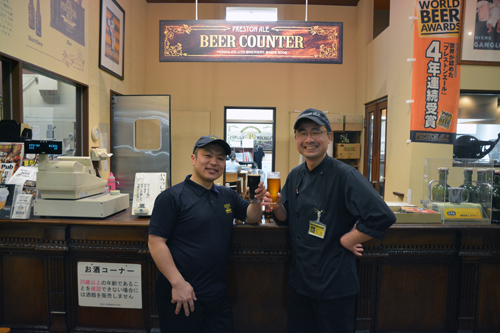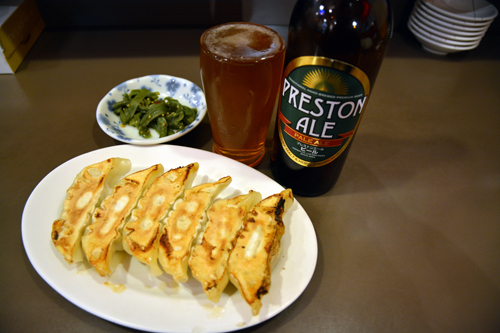by Kumagai Jinya

Joyful Honda is the name of a home furnishings store with some fifteen branches across the Kanto area, and in the corner of one in Utsunomiya they produce none other than Preston Ale. Such a business, with all its building supplies and hardware, gives the impression of “craft” and things made by hand—beer, it seems, is just an extension of that spirit.
Preston Ale was founded in 2002, though the original location was in Chiba New Town in Chiba’s Inzai City—the brewery was unveiled at that branch’s opening. Joining Joyful Honda’s ranks at that time was Kikuchi Akira, who is still the head brewer today.
Their opening in 2002 coincided with a serious decline in craft beer after its initial burst of popularity, but Kikuchi was already a veteran by then, with ample experience in the beer industry. His career, in fact, paralleled the history of craft beer in Japan. He was one of the original employees at Echigo Beer, the first craft brewery to receive its license in 1995 following the easing of brewing laws. After three years at Echigo Beer, he worked for three more years at a professional outfit that assisted in the opening of new breweries. In addition to helping launch a handful of breweries, he also briefly participated in the running of a now-defunct brewpub in Ikebukuro. His fortunes then took him to Aizu Brewery (which ceased operations a few years ago) before he finally found his landing spot at Preston Ale.
While a university student, Kikuchi traveled the world as a backpacker and in Israel discovered Gold Star Beer. From there he went to Munich where he immersed himself in Oktoberfest celebrations. The wonderful taste of the beer left quite an impression on him, encouraging him to travel to the outskirts of Munich, to the world-famous Benedictine Weihenstephan Abbey, which is the world’s oldest brewery still in operation. There, he figuratively pounded on the gates, begging them to make a brewer of him. They refused, “Come back after you’ve studied elsewhere for two years.” While roaming around Germany looking for a place to take him in, he found one that would give him a chance as long as he didn’t need a salary. In order to save enough money for his living expenses, he traveled back to Japan and, after a brief period, contacted the brewery again. “We’re very sorry,” they said, “but things have changed and we can’t accommodate you anymore.”
This hardly dampened his passion to brew, though, and Kikuchi refused to give up on his dream. Then one day he read in the newspaper that a placed called Uehara Brewery in Niigata City was preparing to produce craft beer. This was what eventually became Echigo Beer. He wrote them a letter and, recognizing his passion, the company gave him the green light to join.
The origin of Preston Ale’s name harks back to a time when the president of Honda Sangyo (the parent company) was in the English town of the same name, enjoying its famous ales with the food—it was an experience he would never forget, so he borrowed the name. The original lineup consisted of Pale Ale, Brown Ale, a fruity Golden Ale and a “non-alcohol” brew (that actually has 0.7% alcohol).
As ample data shows, and as many from the industry remember, the late 1990s saw a rapid decline of the initial “ji-beer boom”, with rock bottom coming around 2003. It was a terrible time for Preston Ale, which had just launched. In 2004, they began operations at the Utsunomiya branch (at present, they no longer brew at the Chiba New Town branch), but things did not get better. What eventually changed their fortunes was Popeye, in Ryogoku, which raised their profile by serving their beer. Other places followed and their beer is now available at numerous locations to this day. Their close ties with Popeye didn’t end there. Owner Aoki contracted several original house brews, including “Late Fall Brown Ale” and “Good Job IPA.” The latter in particular was instrumental in branding Preston Ale. In 2012, the company brought on Suto Katsushi as an additional brewer, after a stint at Sapporo Beer’s factory in Nasu, and then at Nikko Beer, which unfortunately shut down in 2012.
Their current line-up includes Pale Ale, Brown Ale, IPA and Irish Ale (a stout). The company has won numerous medals at the World Beer Awards, most notably, world’s best export stout in 2009 and 2011 for their Irish Ale. Many fans that snap up the beer claim, “We like it because of its mild character.”
The Brown Ale, however, is one of my favorites. It boasts excellent aroma with a rich nuttiness that imparts the promise of sweetness. Indeed, take a sip and that sweetness teases the palate before quickly subsiding. The finish is particularly crisp, with no cloying flavor. Among those who have imbibed it, there are perhaps many that think, “I wish it had more character,” but I think it’s this mildness that distinguishes it. Kick back and give it a taste—its gentle aromas and subtle sweetness are plenty enough to savor, and the beer also pairs very well with food. The prominent nuttiness, for example, splendidly complements charcoal-grilled food. Its mildness and gentle carbonation, meanwhile, won’t fill you up if you are enjoying it with food. Additionally, once or twice a year they brew their Shirasagi no Megumi (“Bounty of the Little Egret”) brand. This beer utilizes local, organic barley, but to profile that flavor and create good balance, they go easy on the hops.
On their brewing philosophy, Kikuchi says, “We place great importance on our flagship beers and returning customers.” To that end, “continuity” is important. This has two meanings: they must keep operations going so that they can always satisfy customers looking forward to their beers, and they must maintain consistent quality. To achieve the latter, they embrace the concept “sanitation is everything.” If they neglect this and invite an infection, then they have to dump the beer—an act which earns them the displeasure of the local tax office (which controls their license), the financial repercussions of having wasted valuable ingredients, and the loss of trust among their consumers. “Continuity” seems key whatever the angle.
At the brewery there is a counter where they sell bottled beer and where Kikuchi and Suto both have the opportunity to talk to customers. Comments from those that come regularly breathe life into their brewing endeavors and motivate them to always produce something delicious. Beside the retail counter is a small eatery called Preston Café where you can drink the beer with some food. There are similar Preston Cafes serving Preston Ale at the Nitta store in Ota City (Gunma), the aforementioned Chiba New Town store and the Hitachinaka branch in the city of the same name in Ibaraki Prefecture. If you live nearby, definitely drop in for a few.
Other places to drink Preston Ale include Utsunomiya Gyoza-kan, a gyoza chain restaurant that began serving bottles in 2012. In the JR Utsunomiya Station building there is a branch appreciated by those traveling from afar. The bitterness of the Pale Ale pairs well with the umami from the meat and garlic in their gyoza. With the Brown Ale, definitely try the fried gyoza whose blackened skin complements the aromas of the beer. The sauce, which is a little heavy on the vinegar, also works in interesting ways with the Brown Ale’s sweetness, yielding a pleasing sweet-and-sour flavor. In Utsunomiya’s downtown area, there’s also a beer pub called Blue Magic (operated, incidentally, by Tochigi Microbrewery’s Utsunomiya Brewery) where you can enjoy a few of Preston Ale’s brews.
Beyond Tochigi Microbrewery, Utsunomiya is also home to Romanchikku Mura (Romantic Village) brewery, which also allows people to drink locally. Last year, breweries in the prefecture held their second installment of the Tochigi Craft Beer Festa. Preston Ale isn’t the only reason, then, you should be planning a trip out to Tochigi this year.

This article was published in Japan Beer Times # () and is among the limited content available online. Order your copy through our online shop or download the digital version from the iTunes store to access the full contents of this issue.



